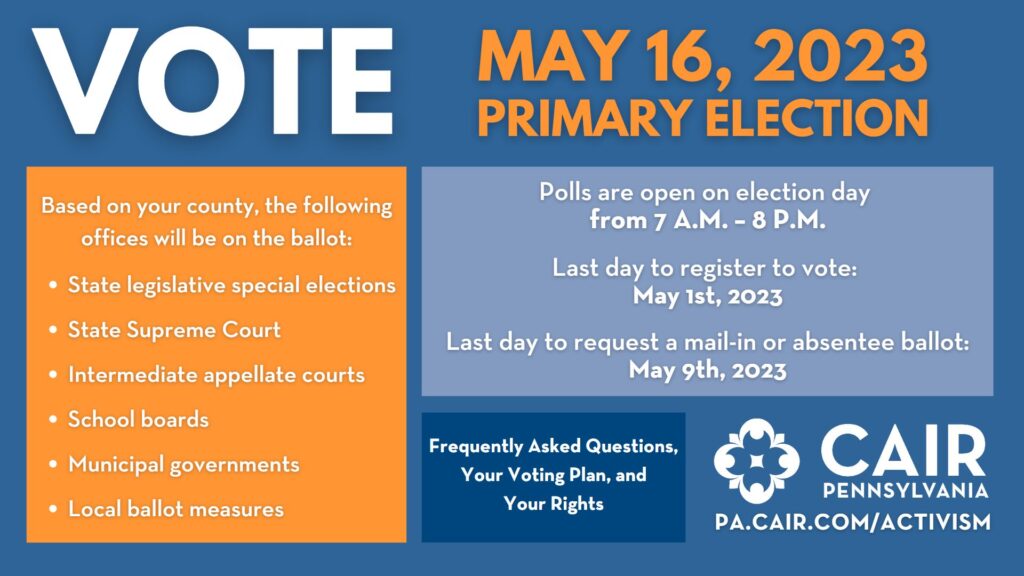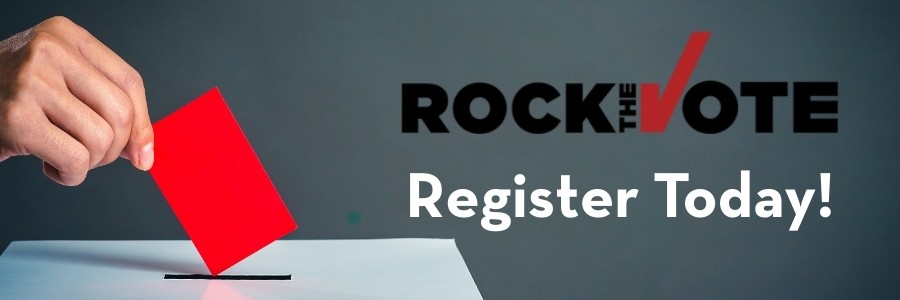2023 Primary Elections in Pennsylvania are on Tuesday, May 16th, 2023
Based on your county, the following offices will be on the ballot: Special state legislative, State Supreme Court, intermediate appellate courts, school boards, municipal governments, and local ballot measures.
- Deadline to register to vote: Monday, May 1
- Deadline to request mail or absentee ballot: 5 p.m. on Tuesday, May 9
- Deadline to return mail ballot: 8 p.m. on Tuesday, May 16 (postmarks do not count)
- Deadline to submit military and overseas absentee ballots: 11:59 p.m. on May 15
- Deadline for the county to receive military and overseas absentee ballots: Tuesday, May 23
- Visit PAVoterInfo.com for information in multiple languages (عربي | বাংলা | 中国人 | Ayisyen | Bahasa Indonesia | ខ្មែរ | 한국어 | नेपाली | Português | Español | اردو | Tiếng Việt)
- Deadline to register to vote: Monday, May 1
- Deadline to request mail or absentee ballot: 5 p.m. on Tuesday, May 9
- Deadline to return mail ballot: 8 p.m. on Tuesday, May 16 (postmarks do not count)
- Deadline to submit military and overseas absentee ballots: 11:59 p.m. on May 15
- Deadline for the county to receive military and overseas absentee ballots: Tuesday, May 23
- Visit PAVoterInfo.com for information in multiple languages (عربي | বাংলা | 中国人 | Ayisyen | Bahasa Indonesia | ខ្មែរ | 한국어 | नेपाली | Português | Español | اردو | Tiếng Việt)
Who is ineligible to vote?
- If you are registered to a third party or to no party at all, you will not be allowed to vote for major party candidates. If you want to participate in a party’s primary, you must change your registration to one of the parties on or before May 1.
- People who are in prison because of a felony conviction and who won’t be released before the election.
- People who have been convicted of violating Pennsylvania election laws within the past four years.
- People who are not citizens of the United States of America (green card holders, student visa holders, etc.)
- People under the age of 18 on the day of the election.
I am not sure if I am registered to vote, or at which address.
No problem. You can check your status at PA Voter Services.
How can I learn who are the people running in my area? Who should I vote for?
CAIR-Philadelphia is a 501(c)(3) non-profit organization and does not endorse/support candidates or any political party. In the coming weeks we hope to share digital tools that list candidates and their platforms.
Can I cast my ballot early or via mail?
Yes. Pennsylvania allows voting via mail. You need to visit pavoterservices.pa.gov and note you would like to cast your vote via mail- you do not a reason to utilize this option. Absentee voting is also possible if you will be away or you are ill. Visit the link above for both options.
Your Voting Plan and Your Rights
May 16 Primary
The 2023 Pennsylvania Primary will take place on Tuesday, May 16th. CAIR-Pennsylvania is urging all American Muslims to make a plan to vote on election day!
- Check your polling station.
- Did you vote by mail? Check the status of your ballot.
- Make sure on election day you protect your right to the ballot box and do not be swayed.
- Check pa.cair.com/activism for multilingual election day helpline information.
- Here are some important tips regarding voter rights in Pennsylvania:
- Only first-time voters, or those voting for the first time in a new precinct, must show ID. Acceptable ID includes both photo and non-photo ID. Registered first-time voters who do not bring ID to the polls can return with identification or must be offered a provisional ballot.
- Voters who applied for and received a mail ballot and then decide they want to vote at the polls must bring their mail ballot packet with them to be voided.
- If a voter applied for a mail ballot but did not return it and no longer has the mail ballot and envelopes, they may vote by provisional ballot at their polling place on Election Day. Their county board of elections will then verify that they did not vote by mail before counting their provisional ballot.
- If a voter applied for a mail ballot but never received it, they should vote by provisional ballot at the polls on Election Day. Their county board of elections will then verify that they did not vote by mail before counting their provisional ballot.
- If a voter’s name is not in the poll book, poll workers can call the County Board of Elections to see if the voter is registered in another precinct in the county. Registered voters who are in the wrong precinct polling place should go to the correct polling place to vote, but a voter who believes he or she is registered in the precinct and should be listed in the poll book is entitled to cast a provisional ballot.
- Voters who moved within Pennsylvania but did not update their address in time before the election may vote one more time in their previous precinct, but they must update their address at the polling place.
- If 50 percent or more of the voting machines at a polling place are not working, voters have the right to use an emergency paper ballot. Poll workers should immediately offer the ballots but, if they do not, voters should request one rather than leave without voting.
- If a voter is challenged on the basis of identity or residency, the voter may vote normally by signing a challenge affidavit and producing a witness who is also a registered voter in the precinct to vouch for them. If the voter cannot or does not want to produce a witness, the voter may cast a provisional ballot. Identity and residency are the only bases for challenging a voter at a polling place.
- Voters have the right to assistance at the polling place, including foreign language or literacy assistance. A voter may select any person to assist as long as the person is not their employer, union representative, or the Judge of Elections. Voters do not need to be designated as “assistance permitted” in the poll book to receive help. A person who wants assistance will be asked to sign an Assistance Declaration at the precinct unless the poll book already indicates “assistance permitted.”
- Voters have the right to refuse assistance.
- Voters have the right to vote without being subjected to intimidation, harassment, or discriminatory conduct. A voter who experiences intimidation should report it to their county board of elections and the district attorney’s office. Voters can also call the Department of State’s year-round voter hotline at 1-877-VOTESPA (1-877-868-3772)
- Who do I vote for?
- CAIR-Pennsylvania does not endorse any party or candidate. BallotReady and Vote411 provide sample ballots based on the address if you would like to look at the candidates and races.
Read the Directory of American Muslim Elected Officials
Note about the CAIR’s Congressional Scorecard and Other Election Empowerment Activities: As a nonpartisan organization, CAIR can encourage American Muslims to participate in national and state elections, conduct voter registration and get-out-the-vote drives, provide training programs, issue briefings, organize candidate forums, volunteer in campaigns, and lead get-out-the-vote drives. Nonprofits cannot engage in political activities that support one candidate or party over another, but we are committed to making our community’s voice and vote heard.


